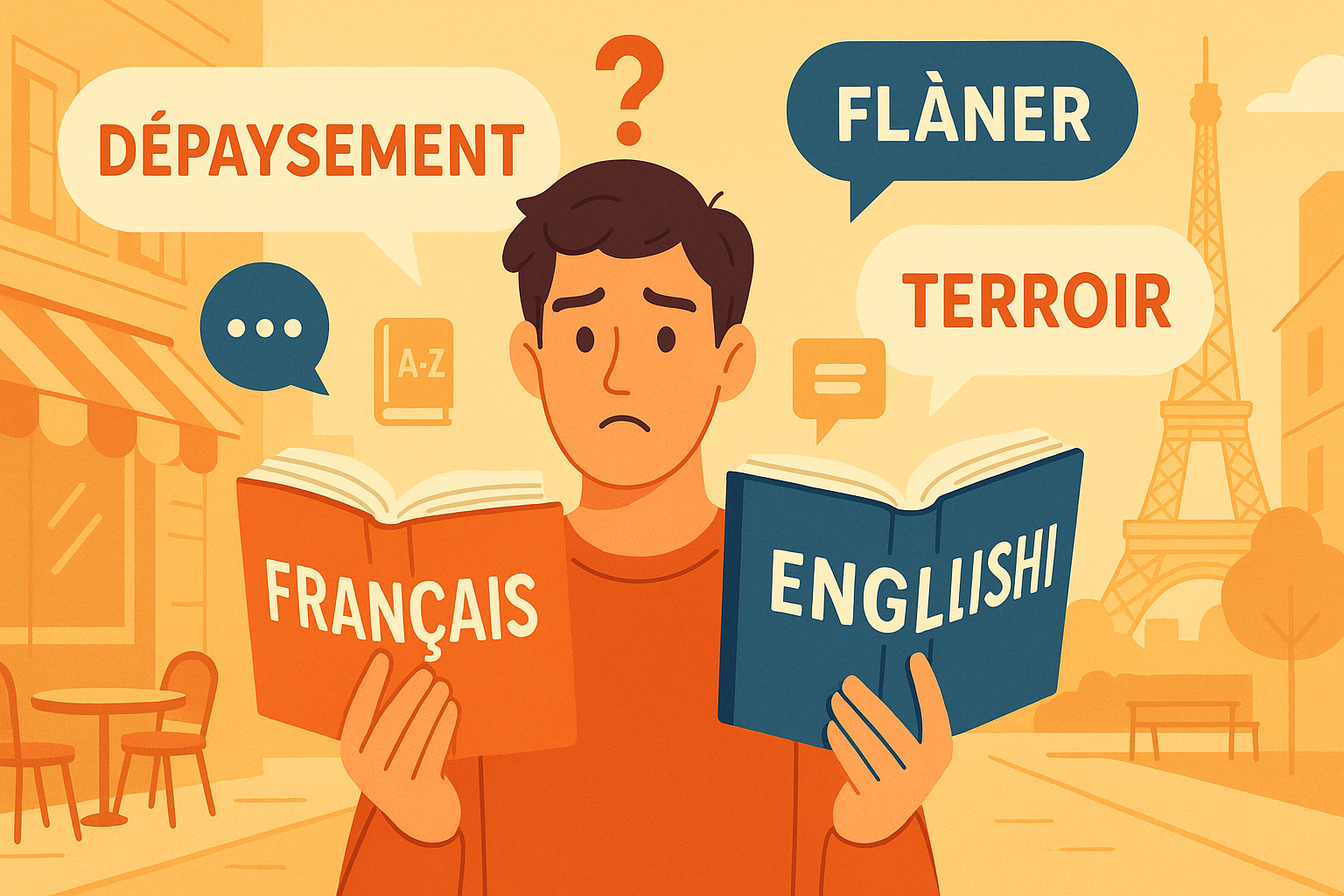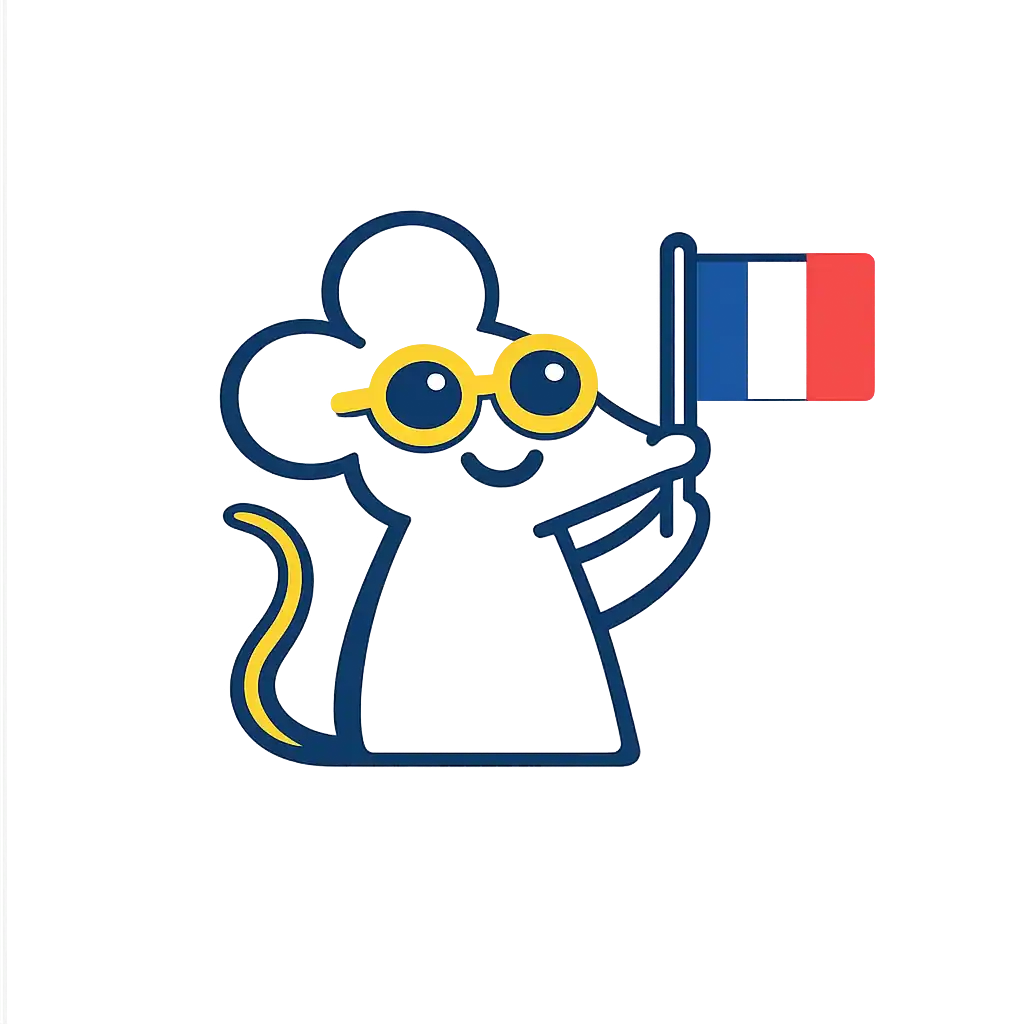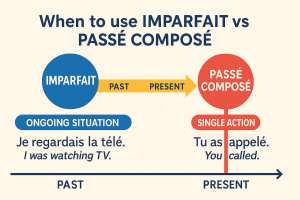15 French words that don’t translate to English — complete guide (A1–B1)
Some French words capture concepts, feelings, and experiences that English simply cannot express in a single term. This guide explores fifteen essential untranslatable French words with detailed explanations, pronunciation guidance, real-world examples, and practical strategies for using them naturally in conversation.

Why some French words resist translation
Language reflects culture, and certain concepts emerge organically within specific cultural contexts without equivalent experiences elsewhere. French culture emphasizes nuanced emotional states, social rituals, aesthetic appreciation, and philosophical perspectives that English-speaking cultures express differently or subdivide into multiple terms. These untranslatable words reveal French cultural priorities and worldviews.
Understanding untranslatable vocabulary accelerates cultural literacy alongside language proficiency. When you grasp why “flâner” exists as a distinct concept in French but not English, you simultaneously learn about Parisian urban culture, leisure values, and social expectations around time use. These words function as cultural artifacts embedded in everyday speech.
Learning untranslatable words also prevents the common mistake of forcing direct translation where none exists. Rather than searching for impossible English equivalents, you develop comfort with circumlocution—explaining concepts through descriptive phrases—which actually strengthens overall communication skills and deepens your French learning journey.
The 15 essential untranslatable French words
1. Dépaysement /depɛizmɑ̃/
Literal meaning: “De-country-ment” (from dé- + pays + -ment)
What it captures: The feeling of disorientation, strangeness, or culture shock experienced when away from your home country or familiar environment. It encompasses both the unsettling aspects of displacement and the exhilaration of discovery. Unlike “homesickness,” dépaysement includes positive dimensions of adventure and personal transformation through exposure to new contexts.
English approximation: Culture shock, disorientation, being a fish out of water (but none capture the full nuance)
🇫🇷 FR — Le dépaysement que j’ai ressenti en arrivant à Tokyo était intense. /lə depɛizmɑ̃ kə ʒe ʁəsɑ̃ti ɑ̃n‿aʁivɑ̃ a tɔkjo ete ɛ̃tɑ̃s/
🇺🇸 EN — The disorientation/culture shock I felt arriving in Tokyo was intense.
2. Flâner /flɑne/
What it captures: To stroll leisurely without specific destination or purpose, observing surroundings with relaxed attentiveness. Flâner implies aesthetic appreciation and deliberate slowness—a rejection of efficiency in favor of experiential richness. The flâneur (one who flânes) became a literary archetype representing urban observation and contemplative wandering.
English approximation: To stroll, wander, amble (but missing the philosophical dimension)
🇫🇷 FR — J’aime flâner dans les rues de Montmartre le dimanche matin. /ʒɛm flɑne dɑ̃ le ʁy də mɔ̃maʁtʁ lə dimɑ̃ʃ matɛ̃/
🇺🇸 EN — I love strolling/wandering through Montmartre streets on Sunday morning.
3. Retrouvailles /ʁətʁuvɑj/
What it captures: The joy of reuniting with someone after a long separation. This plural noun emphasizes the mutual emotional experience and celebrates reconnection. English lacks a single word for this specific positive emotion accompanying reunion, instead requiring phrases like “joyful reunion” or “being reunited.”
English approximation: Reunion, getting back together (but missing the emotional joy emphasis)
🇫🇷 FR — Les retrouvailles avec ma famille après deux ans étaient émouvantes. /le ʁətʁuvɑj avɛk ma famij apʁɛ døz‿ɑ̃ ete emuvɑ̃t/
🇺🇸 EN — The reunion with my family after two years was moving.
4. L’esprit de l’escalier /lɛspʁi də lɛskalje/
Literal meaning: “Staircase wit”
What it captures: The phenomenon of thinking of the perfect witty comeback or clever response only after leaving a conversation—typically while descending the stairs after a social gathering. This phrase acknowledges the universal frustration of delayed eloquence and captures a specific temporal-social dynamic.
English approximation: Afterthought, belated wit, thinking of the perfect comeback too late
🇫🇷 FR — J’ai eu l’esprit de l’escalier pendant tout le trajet en métro. /ʒe y lɛspʁi də lɛskalje pɑ̃dɑ̃ tu lə tʁaʒɛ ɑ̃ metʁo/
🇺🇸 EN — I had staircase wit / thought of perfect comebacks during the entire metro ride.
5. Terroir /tɛʁwaʁ/
What it captures: The complete set of environmental factors—soil, climate, terrain, local tradition—that give agricultural products, especially wine and cheese, their distinctive character and unique taste. Terroir represents a holistic concept linking geography, ecology, and cultural practice. English borrows the French term directly because no equivalent exists.
English approximation: Sense of place (inadequate—English often just uses “terroir”)
🇫🇷 FR — Ce vin exprime parfaitement le terroir bourguignon. /sə vɛ̃ ɛkspʁim paʁfɛtmɑ̃ lə tɛʁwaʁ buʁɡiɲɔ̃/
🇺🇸 EN — This wine perfectly expresses the Burgundian terroir.
6. Bricolage /bʁikɔlaʒ/
What it captures: Making do with whatever materials are available, creating something functional or artistic through improvisation and resourcefulness. Unlike “DIY” which implies following instructions, bricolage emphasizes creative adaptation and making something from disparate elements without formal planning. The term extends metaphorically to intellectual and artistic work.
English approximation: DIY, tinkering, jury-rigging (but missing the creative improvisational aspect)
🇫🇷 FR — Il a réparé la chaise avec du bricolage ingénieux. /il a ʁepaʁe la ʃɛz avɛk dy bʁikɔlaʒ ɛ̃ʒenjø/
🇺🇸 EN — He fixed the chair with ingenious improvisation/tinkering.
7. Joie de vivre /ʒwa də vivʁ/
Literal meaning: “Joy of living”
What it captures: A cheerful enjoyment of life, an exuberant enthusiasm for living fully and appreciating life’s pleasures. This phrase suggests not just happiness but an active, spirited approach to existence. English borrows this phrase directly because “joy of living” sounds awkward and doesn’t capture the same cultural concept.
English approximation: Zest for life, exuberance (inadequate—English often borrows “joie de vivre”)
🇫🇷 FR — Elle rayonne d’une joie de vivre contagieuse. /ɛl ʁɛjɔn dyn ʒwa də vivʁ kɔ̃taʒjøz/
🇺🇸 EN — She radiates contagious joie de vivre / zest for life.
8. Savoir-faire /savwaʁ fɛʁ/
Literal meaning: “Knowing how to do”
What it captures: Practical knowledge, competence, and expertise demonstrated through skillful execution. It implies both technical ability and social grace—knowing not just what to do but how to do it with style and appropriateness. English borrows this term directly for situations requiring sophisticated practical knowledge.
English approximation: Know-how, expertise, competence (but missing the elegance dimension)
🇫🇷 FR — Son savoir-faire en pâtisserie est impressionnant. /sɔ̃ savwaʁ fɛʁ ɑ̃ pɑtisʁi ɛt‿ɛ̃pʁɛsjɔnɑ̃/
🇺🇸 EN — His expertise/savoir-faire in pastry-making is impressive.
9. Dépanneur /depanœʁ/
What it captures: Originally meaning someone who repairs or helps in emergencies, in Quebec French this became the standard term for convenience store—a place that “helps you out” when you need something quickly. The linguistic evolution reveals cultural attitudes toward commerce and community assistance.
English approximation: Convenience store (in Quebec), repair person (in France)
🇫🇷 FR (Quebec) — Je vais au dépanneur chercher du lait. /ʒə vɛz‿o depanœʁ ʃɛʁʃe dy lɛ/
🇺🇸 EN — I’m going to the convenience store to get milk.
10. Chez /ʃe/
What it captures: At or to someone’s home, place of business, or domain. This preposition combines location with possession and social relationship in ways English requires multiple words to express. “Chez moi” means more than “at my house”—it encompasses your personal space and domestic sphere as an extension of identity.
English approximation: At (someone’s place), at home, at the place of (requires multiple words)
🇫🇷 FR — On se retrouve chez moi à vingt heures. /ɔ̃ sə ʁətʁuv ʃe mwa a vɛ̃t‿œʁ/
🇺🇸 EN — We’ll meet at my place at eight p.m.
11. Sortable /sɔʁtabl/
What it captures: Someone appropriate or acceptable to bring out in public or introduce to others. This adjective evaluates social presentability and whether a person meets social standards for public association. English lacks a single-word equivalent for this social judgment.
English approximation: Presentable, socially acceptable (but more specifically about public company)
🇫🇷 FR — Il faut que tu sois sortable pour le dîner chez mes parents. /il fo kə ty swa sɔʁtabl puʁ lə dine ʃe me paʁɑ̃/
🇺🇸 EN — You need to be presentable/appropriate for dinner at my parents’ house.
12. Yaourter /jauʁte/
What it captures: To fake singing lyrics you don’t know, producing nonsense syllables that sound vaguely like the original. This colloquial verb specifically addresses the act of phonetic approximation when singing along to foreign language songs or forgotten lyrics, creating yogurt-like sounds instead of words.
English approximation: To mumble/fake the words (but no single verb exists)
🇫🇷 FR — Je yaourtais les paroles parce que je ne les connaissais pas. /ʒə jauʁtɛ le paʁɔl paʁskə ʒə nə le kɔnɛsɛ pa/
🇺🇸 EN — I was fake-singing/mumbling the lyrics because I didn’t know them.
13. Avocat /avɔka/
Cultural note: This word means both “lawyer” and “avocado”—same spelling, same pronunciation, different meanings. While technically two separate words rather than one untranslatable term, the homonym creates uniquely French wordplay and confusion opportunities that demonstrate how language accidents create cultural moments.
Context determines meaning: Profession vs. fruit
🇫🇷 FR — Mon avocat m’a conseillé d’attendre. /mɔ̃n‿avɔka ma kɔ̃sɛje datɑ̃dʁ/
🇺🇸 EN — My lawyer advised me to wait.
🇫🇷 FR — J’adore l’avocat dans les salades. /ʒadɔʁ lavɔka dɑ̃ le salad/
🇺🇸 EN — I love avocado in salads.
14. Profiter /pʁɔfite/
What it captures: To take advantage of an opportunity, enjoy something fully, or make the most of a situation. “Profiter de” implies active appreciation and seizing the moment rather than passive enjoyment. The imperative “Profitez-en!” encourages someone to fully embrace an experience.
English approximation: Enjoy, take advantage of, make the most of (requires context-dependent translation)
🇫🇷 FR — Profitez-en pendant que c’est gratuit ! /pʁɔfite zɑ̃ pɑ̃dɑ̃ kə sɛ ɡʁatɥi/
🇺🇸 EN — Take advantage of it / Enjoy it while it’s free!
15. Bon vivant /bɔ̃ vivɑ̃/
Literal meaning: “Good liver” (one who lives well)
What it captures: A person who enjoys life’s pleasures, especially good food and wine, with enthusiasm and sociability. This phrase celebrates hedonistic appreciation of sensory experiences and convivial company. English borrows the term directly because “good liver” creates confusion with the organ.
English approximation: Epicurean, hedonist (but with more positive connotation)
🇫🇷 FR — C’est un vrai bon vivant qui connaît tous les meilleurs restaurants. /sɛt‿œ̃ vʁɛ bɔ̃ vivɑ̃ ki kɔnɛ tu le mɛjœʁ ʁɛstɔʁɑ̃/
🇺🇸 EN — He’s a true bon vivant who knows all the best restaurants.
How to handle untranslatable words in conversation
Strategy 1: Use circumlocution confidently
When encountering untranslatable words, describe the concept using multiple English words rather than searching for impossible one-word equivalents. This approach builds explanatory skills valuable across language learning. Practice explaining “flâner” as “walking slowly through streets observing everything around you without specific destination” until the description becomes natural.
Strategy 2: Borrow the French term directly
English already incorporates numerous French loanwords—rendezvous, déjà vu, faux pas, cliché. Continue this tradition when discussing concepts lacking English equivalents. Using “terroir” or “joie de vivre” in English conversation demonstrates cultural literacy and introduces others to useful concepts. Italicize borrowed terms in formal writing to indicate foreign language use.
Strategy 3: Embrace cultural concepts as learning opportunities
Each untranslatable word reveals cultural priorities and worldviews. When you learn “retrouvailles,” you simultaneously discover French emphasis on maintaining long-term relationships and celebrating reunion rituals. These words function as cultural artifacts providing insight into values, social structures, and collective experiences shaping French identity.
💡 Learning tip: Create personal associations with untranslatable words by connecting them to specific memories or situations. Remember “dépaysement” by recalling your first confusing day in a foreign city. These emotional anchors strengthen retention.
Strategy 4: Practice in context rather than isolation
Memorizing definitions proves less effective than encountering words in authentic contexts. Watch French shows on Netflix, read contemporary literature, or listen to podcasts where these terms appear naturally. Contextual exposure reveals connotations, register, and appropriate usage patterns that definitions cannot capture.
Why English lacks these concepts
Language evolution reflects cultural needs and priorities. French developed “flâner” because Parisian urban culture created social spaces conducive to aimless observation—wide boulevards, café terraces, public gardens. English-speaking cities historically emphasized commercial efficiency over contemplative strolling, thus never codifying the practice linguistically.
Similarly, “terroir” emerges from French agricultural traditions emphasizing regional distinctiveness in wine and cheese production. English-speaking countries with different agricultural histories and marketing approaches never required a single term encompassing soil, climate, tradition, and taste. Cultural materialism explains linguistic gaps through examining how societies organize production, consumption, and social relations.
Understanding why vocabulary gaps exist deepens cultural comprehension alongside linguistic competence. Every untranslatable word represents a cultural story about values, priorities, and collective experiences unique to French-speaking communities.
Building your untranslatable vocabulary systematically
Create a personal untranslatable words journal
Maintain a dedicated notebook or digital file collecting untranslatable terms you encounter. For each word, record pronunciation (IPA), multiple example sentences, situations where it applies, and personal memories connecting you to the concept. This active documentation process strengthens retention through elaborative encoding.
Practice explaining concepts in both languages
Regularly challenge yourself to explain these words first in English (circumlocution practice), then in French using the actual term in a sentence. This bidirectional approach builds both productive and receptive skills while reinforcing conceptual understanding. Record yourself explaining each concept to identify areas needing improvement.
Engage with authentic French media systematically
Select French cinema classics or contemporary films featuring these concepts prominently. “Amélie” showcases “flâner” visually, while “Les Saveurs du Palais” explores “terroir” extensively. Pause when encountering untranslatable terms, note the context, and consider how the concept manifests in the scene.
Common mistakes when learning untranslatable words
Mistake 1: Forcing direct translation
Students often insist on finding single English equivalents, creating awkward or incorrect translations that miss nuanced meanings. Avoid translating “flâner” as simply “walk” or “dépaysement” as “homesickness.” Accept that circumlocution sometimes provides more accurate communication than inadequate one-word substitutes.
Mistake 2: Using words outside appropriate contexts
Understanding denotation differs from mastering connotation and appropriate usage contexts. “Bon vivant” applies to adults with refined tastes, not children eating ice cream enthusiastically. Similarly, “terroir” references agricultural products with regional character, not mass-produced foods. Contextual appropriateness requires exposure to authentic usage.
Mistake 3: Neglecting pronunciation practice
Many students understand concepts intellectually but cannot pronounce words correctly, limiting speaking opportunities. Invest time mastering French pronunciation patterns including nasal vowels, the French R, and liaison. Correct pronunciation builds confidence for actually using these words in conversation rather than merely recognizing them passively.
Study glossary — untranslatable words reference
| FR | IPA | Concept (EN) |
|---|---|---|
| Dépaysement | /depɛizmɑ̃/ | Culture shock / disorientation |
| Flâner | /flɑne/ | Leisurely aimless strolling |
| Retrouvailles | /ʁətʁuvɑj/ | Joyful reunion |
| L’esprit de l’escalier | /lɛspʁi də lɛskalje/ | Staircase wit / belated comeback |
| Terroir | /tɛʁwaʁ/ | Sense of place (agricultural) |
| Bricolage | /bʁikɔlaʒ/ | Creative improvisation |
| Joie de vivre | /ʒwa də vivʁ/ | Exuberant enjoyment of life |
| Savoir-faire | /savwaʁ fɛʁ/ | Practical expertise with style |
| Dépanneur | /depanœʁ/ | Convenience store (Quebec) |
| Chez | /ʃe/ | At someone’s place |
| Sortable | /sɔʁtabl/ | Presentable in public |
| Yaourter | /jauʁte/ | Fake-singing unknown lyrics |
| Profiter | /pʁɔfite/ | Fully enjoy / take advantage |
| Bon vivant | /bɔ̃ vivɑ̃/ | Epicurean pleasure-seeker |




